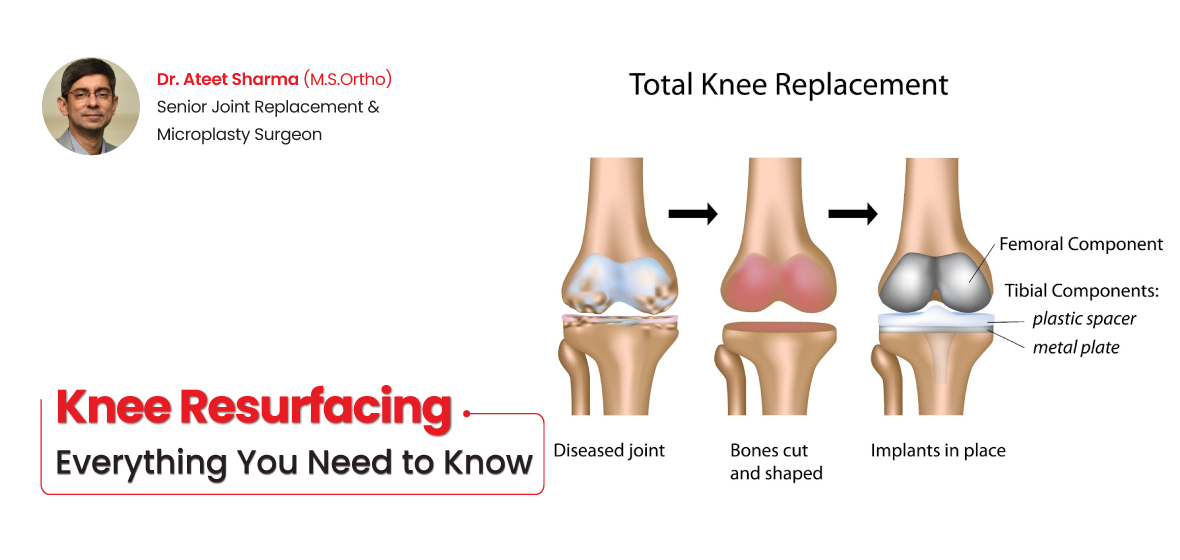
Knee pain is a known problem that usually affects millions of people worldwide. Thus, modern medicine has come up with various alternative sand methods to deal with the situation of knee pain. Conditions like arthritis, injury, or wear and tear due to aging can spark knee pain. Thus, even simple activities might feel difficult. Furthermore, in some severe cases, it can become debilitating, making it difficult to walk, climb stairs, or even sit comfortably. Our Knee Replacement Treatment in Ahmedabad offers a wide range of options to deal with almost every knee problem.
It is a fact that many people turn to "knee replacement surgery" for pain elimination. Sometimes, it might not be the best option for everyone when damage is limited to a specific knee area.
Here, "Knee Resurfacing" enters the field of treatment. It is an innovation and an alternative to a knee replacement. It focuses on only the damaged portion of the joint, leaving the healthy areas untouched. Today, in this blog, we will see everything you need about knee resurfacing. Let us dive into the sea of knowledge of Knee Resurfacing.

Knee Resurfacing is an advanced method that is less invasive than surgical procedures. It focuses on replacing only the damaged portion of the knee joint. It is different from the process of knee replacement, where the entire joint is removed and replaced with an artificial one.
Knee resurfacing concentrates and tries to get back the functionality of the affected area and leave the non-affected area to itself. It is beneficial for those individuals whose knee damage is localized due to any circumstances like osteoarthritis or degenerative conditions.
To understand this in easy terminology, we can state that knee resurfacing can be considered a patch for a small hole in a tire rather than replacing the entire wheel. By addressing the issue of only the damaged part, you can be assured that the rest of the knee joint will be preserved.
Knee Resurfacing is recommended to those individual who are going through the following conditions :
Before making any decision, it is essential to take expert advice to get the best possible solution for your problem. Our expert. Dr Ateet Sharma will also guide you through All About Knee Implant Structure so that you are well aware of the situation you are facing and the solution to the problem.
The whole process of Knee Resurfacing is a structured plan. It aims to remove damaged cartilage and bone while not affecting the healthy tissue. Here is a brief about the various stages involved in Knee Resurfacing
Before the surgery, there will be an evaluation to ensure that the patient is the right fit for knee resurfacing. It includes a test of your medical history and physical examinations. Furthermore, X-rays and MRI scans are also considered in required cases.
Evaluation helps the surgeon know about the extent of damage and which part of the knee requires resurfacing.
General anesthesia helps make the procedure pain-free. As the situation differs, in some cases, spinal anesthesia is used to numb the lower half of the body. Furthermore, the surgeon makes a small incision about 3-5 inches. The location depends upon the area of damage.
The incision made here is much more minimal in comparison to total knee replacement.
The damaged cartilage and bone are removed from the affected areas. It is crucial to ensure that the diseased parts are completely cleared and the healthy tissue is safe. For example, if the inner side of the knee is damaged due to osteoarthritis, only the cartilage is removed, and the other healthy parts are not touched.
Metal implants are inserted, which are made of durable metal alloy. It helps mimic the natural movement of the knee. As they are custom-made, there is not much of a problem here in this part. It helps in smooth functioning and improves mobility.
The implant implant is securely attached to the bone using bone cement, and this helps it to naturally bond the bones. Now, when the implant is in place, the surgeon closes the incision using sutures or staples.
To understand the details of the procedure, you can consult our expert. They will tell you about the treatment which will suit you the best. You can also understand about Robotic Knee Replacement and decide your preferred treatment.
After the surgery, patients are monitored for several hours to ensure no immediate complications. In most cases, the patients can leave the hospital on the same day. The leave depends on the condition and the complexity of the procedure.
You can go for a physical therapy program to restore muscle mobility. Early exercise can prevent stiffness and improve overall results.
Here is a list of benefits associated with Knee Resurfacing
Knee resurfacing is a method used in many situations, and it helps solve any issues when the damage is limited to some area of the knee. Our Orthopedic Surgeon in Ahmedabad has deep experience and knowledge about the conditions and their solutions. With Knee resurfacing, you can have a shorter recovery time and lower risk of complications.
Sometimes, the best solution is not about replacing everything but fixing just what is broken.
© 2025 Dr.Ateet Sharma All rights reserved. | Manage by Nexus